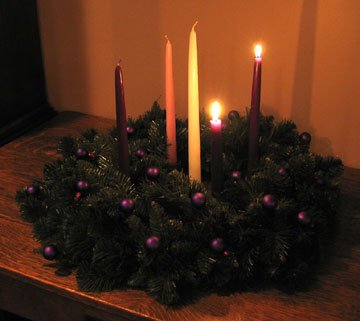
Four Reasons It’s Not “Advent”
Next article: Is “Carol of the Bells” Really Copyrighted?
Previous article: The Roots of This Tree Go Deep

Tomorrow begins the Christmas fast in Byzantine-rite churches following new calendars.[1] Notice that I did not call it “Advent.” Orthodox Christians sometimes lapse into calling this fast “Advent” because it overlaps with the Latin-rite season of preparation for Christmas which goes by that name. But ask yourself: Are they really the same? So, with a nod to the four Sundays of Advent, here are four reasons why they are not.[2]
- The name “Advent” does not appear in the service books. The name “Advent” comes from adventus, meaning “coming.” Adventus became the name Roman Catholics used to designate this season because the word is repeated more than any other, appearing in almost every proper text for the season. By contrast, the comparable Greek word, parousia [παρουσία], appears only once in the entire liturgical cycle leading up to Christmas, in the epistle of the Sunday of the Fathers, two Sundays before Christmas.
If any word is used to designate the season in the service books, it would be tessaracoste [τεσσαρακοστή] — simply “the forty days.”
- They have completely different focuses and emphases. Yes, they both prepare their faithful for Christmas, but the similarity ends there.
Roman Catholic hymnographers had good reason to repeat adventus so many times. The season of Advent meditates on the anticipation of the two advents of the Lord: his birth in the flesh, commemorated at Christmas, and his coming in glory at the end of time. By contrast, the Christmas fast of the Byzantine rite focuses on the prophets who foretold the Lord’s birth. No liturgical text mentions the Lord’s second coming.
- Advent begins the Latin-rite liturgical year. The First Sunday of Advent, four Sundays before Christmas, is the first Sunday of the liturgical year in the Latin rite. The season sets the tone for the liturgical year, which ends on the Sunday of Christ the King, the Sunday before the First Sunday of Advent. Christ the King celebrates the Lord as the present and coming King of kings and Lord of lords, and it neatly completes the theme begun in Advent.
By contrast, the Byzantine-rite liturgical year begins in September with the commemoration of the birth of the Mother of God and ends with the commemoration of her repose (dormition or falling asleep).
- Advent does not last for forty days.[3] As a result, Byzantine-rite Christians who wish to incorporate Advent practices (such as the Advent wreath, with its five candles — four for the weeks of Advent and the fifth for the Christmas season) must resort to destroying the integrity of those practices in order for them to be useful.
Part of the problem resides in the fact that traditionally Orthodox cultures do not place a great deal of emphasis on the winter fast (mirroring the comparative lack of emphasis in the Byzantine-rite liturgical cycle). Although perhaps we could see a lesson in this de-emphasis, the fundamental problem remains: Eastern Christians find themselves living among Christians who place a great deal of emphasis on Advent (though even they are drowning in society’s ever-expanding flood of Christmas exploited for commercial gain).
Honestly, I do not have an answer for that problem — living among Christians with very different traditions — except to note that we lose something when we try to make the gift that we have received look more like someone else’s gift.
- For the Orthodox, the new calendar is the revised Julian calendar, which is almost identical to its counterpart in Byzantine-rite Catholic Churches, the Gregorian calendar. ↩
- I wrote about this previously, as well, by way of a meditation on the beginning of Advent. ↩
- Although historically certain localities in western Europe and the British Isles observed forty day winter fasts that arguably presaged the later celebration of Advent, the Advent cycle has been four weeks for centuries. ↩
The URL to trackback this post is:
http://kevinbasil.com/2012/11/14/four-reasons-its-not-advent/trackback/
3 Responses to “Four Reasons It’s Not “Advent””
Copyright © 2002–2011 Kevin Robert (Basil) Fritts, all rights reserved.
November 14th, 2012 at 10:43 pm
It seems to me that your critiques are all accidents. The essence of Advent is: the period before Christmastide in which we prepare for the coming of the Christ. Whether this preparation is marked by prophesies of his coming or a reflection on the twofold adventus, the word Advent still refers to the same thing: the fast before Christmas. Orthodox are not terminological fundamentalists.
November 17th, 2012 at 3:37 pm
The word “Advent” refers to the two-fold advent. Notice that the word is the same? The essence of both fasts is preparation for the birth of Christ, which is not actually contained in the word “advent.” If the meditation on the coming Lord (either the historical advent, the future advent, or both) were essential, as you imply, then the Greek tradition would use parousia to describe the season, and the liturgical texts would emphasize, in various ways, “the coming one.” As I noted, they do not. (With one, maybe two, exceptions: The epistle for the Sunday of the Fathers, and perhaps one other: The kontakion for the prefeast [Jan 20–24] begins, “Today, the virgin comes to a cave to give birth….” The virgin comes. The focus of the hymn [and of the Christmas kontakion, which it imitates] is not on the Lord’s coming, but on our welcoming him.)
The focus on “coming” is what is accidental to the season. Preparation is what is essential.
November 17th, 2012 at 3:40 pm
I should also note: The Christmas fast does not (after fifteen years) feel like Advent. The two are just completely different.